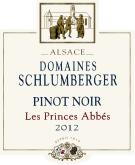History
It is undoubtedly the first pinot grape variety imported from Burgundy, no doubt because of the similarities in topography and climate between Burgundy and Alsace. This prestigious red grape variety was prominent in Alsace in the middle Ages, but then disappeared, except for certain places because of its freshness and fruitiness.
Location
60% comes from the limestones Bollenberg plot and 40% comes from the marl-limestone Grand Cru Saering plot.
Wine-making
Its vinification occurs during a maceration of two weeks. Its growth in traditional tuns for 10 months allows adding a more full-bodied and more complex structure to its typical fruitiness.
Gastronomy
It will go marvelously well with a terrine de champagne, roast pork and fried potatoes, a lamb tajine or a fondue bourguignonne. Serve at a temperature of 16°.
Learn more about food & wine pairingTasting
The colour is garnet, of good intensity.
The nose is open, fruity with notes of black fruit such as blackcurrant and black cherry. After airing, the notes of black fruit are intensified with a slightly spicy character.
On the palate, the onset is fresh, fine and slightly tannic. The middle mouth is rich and full-bodied.
The finish is beautiful and vivacious, with warmth and a delicate scent of wild blackberries.
This wine can be consumed right now but it will be perfect in three to five years.
















